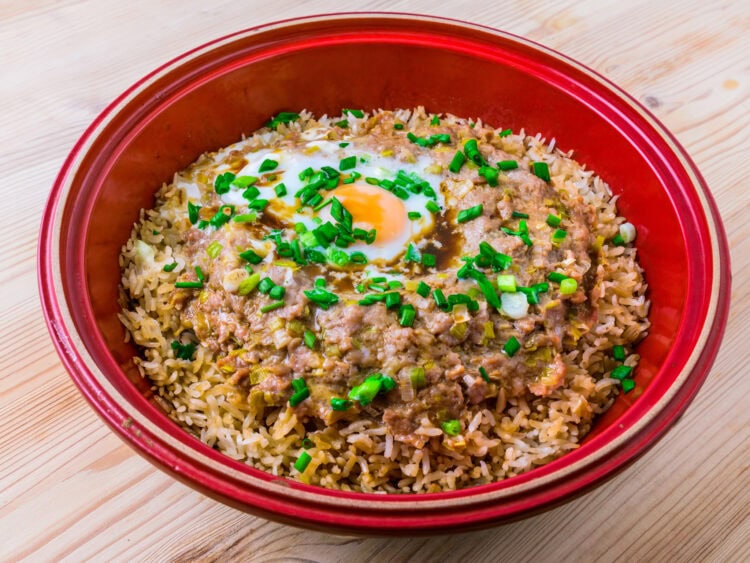A traditional Bou Zai Faan recipe: rice cooked in a clay pot
In Canton, Bo Zai Faan is THE ultimate winter dish, warming you up and delighting your taste buds on cold days. This bowl of steaming rice, traditionally cooked in a clay pot, is a Cantonese staple everyone can agree on.
What is Bou Zai Faan?
Bo Zai Faan, also called Bao Zai Faan (锅饭), is one of the most indulgent and impressive dishes Chinese cuisine has to offer. You do not get the chance to cook in an earthenware pot every day.
When you pull it out of the cupboard, it is for a good reason, and Bou Zai Faan is one of them. The dish is soft in the center and almost charred around the edges (which makes it crispy!), and it was once served on the streets of Hong Kong and Canton.
Traditionally it is cooked in a clay pot (the shaguo) and topped with juicy meat, most often pork or marinated chicken, Chinese sausages, eggs, mushrooms, spring onions, and leeks.
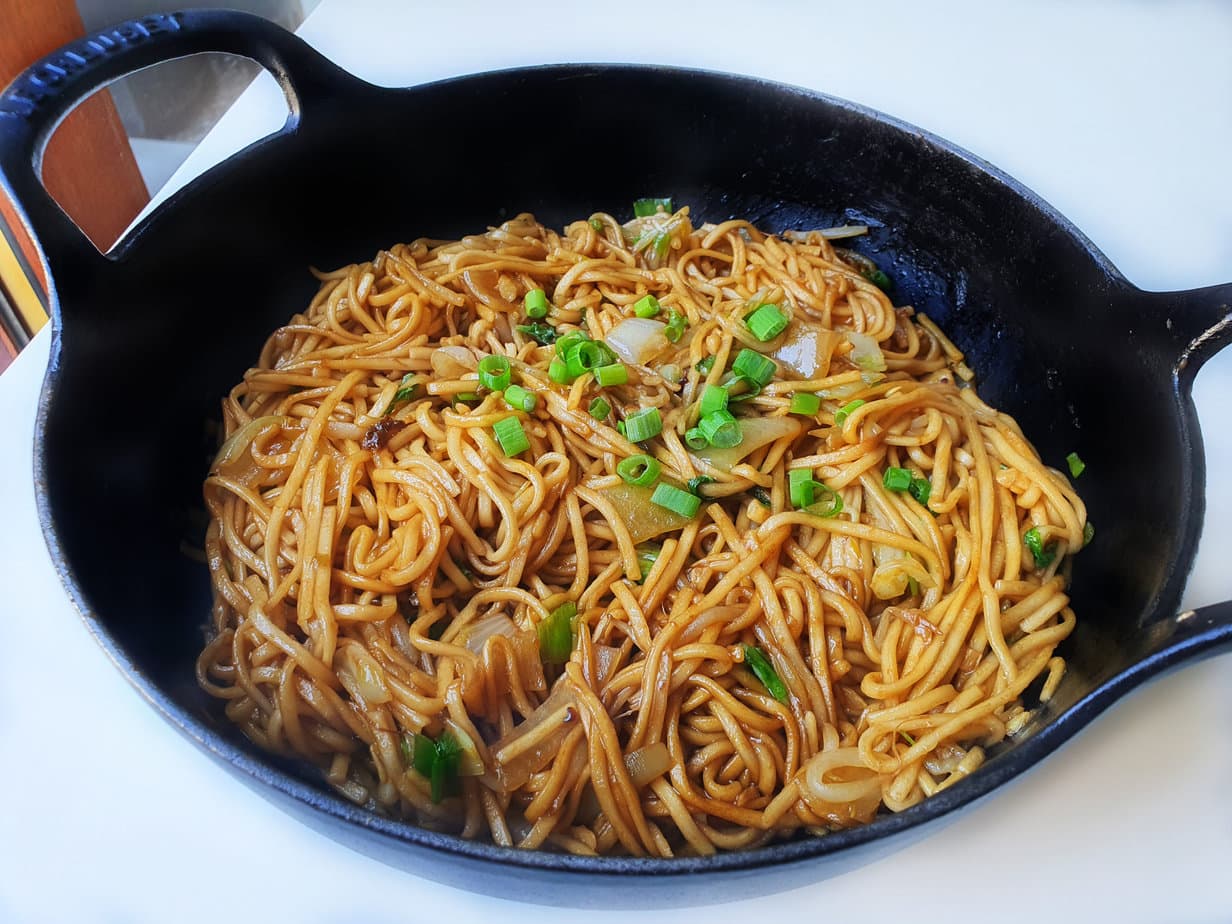
You can add all sorts of toppings, and because indulgence never stops there, everything is seasoned with fragrant Chinese oils and spices.
With Shaoxing wine, star anise, soy sauce, and Sichuan pepper, Bou Zai Faan transports you straight into authentic Chinese cuisine. Because all the elements cook together, the result is an explosion of flavors.
So why insist on a clay pot? In fact, a cast-iron vessel could work just as well. Earthenware, however, can both withstand and retain high heat, and it helps create that coveted crispy rice at the bottom. Comfort and warmth are the watchwords of Bo Zai Faan… and that is all we need!
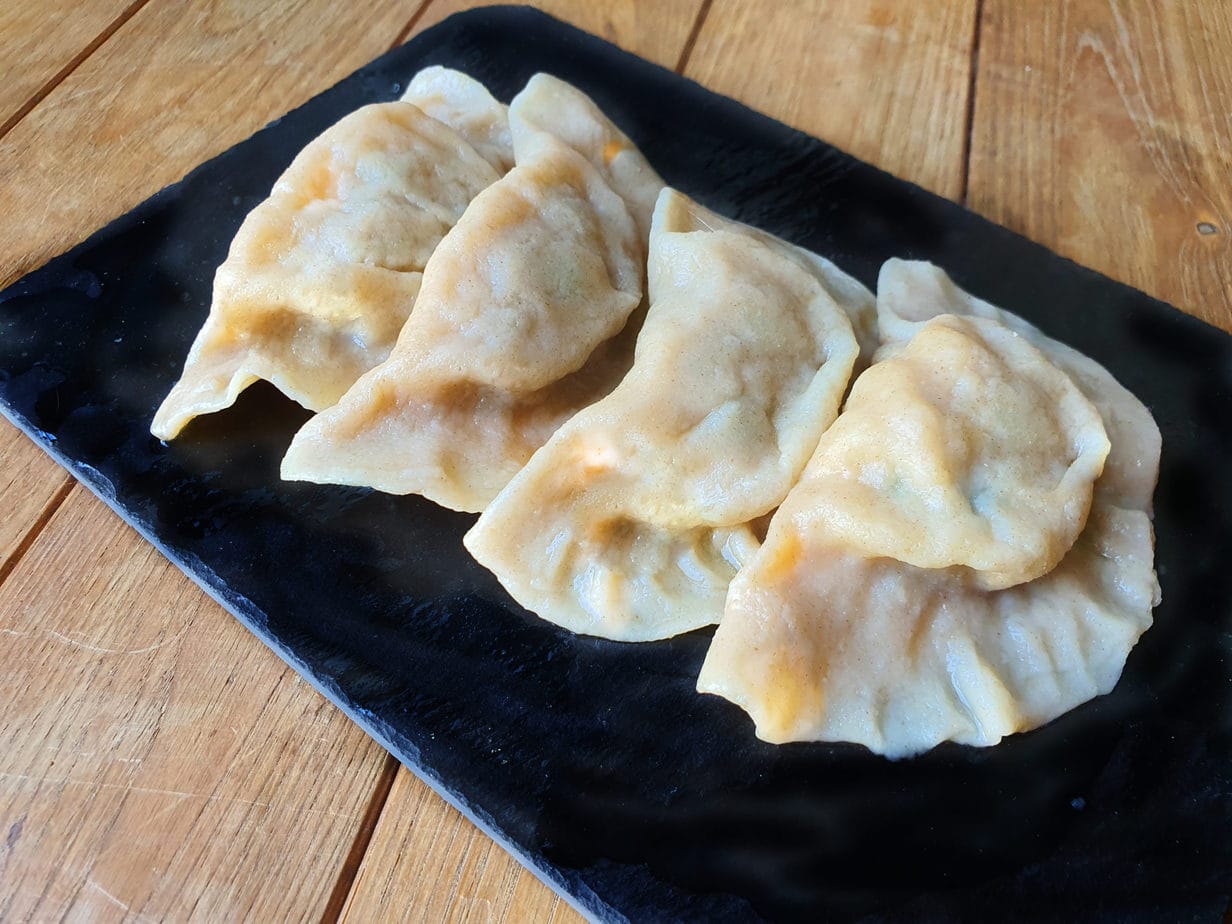
All right, the clay pot is great, but this recipe adapts the method developed by the bloggers “Chinese Cooking Demystified” so you can achieve the same result in a cast-iron Dutch oven using a combination of oven and stovetop cooking.
The main ingredients of Bo Zai Faan
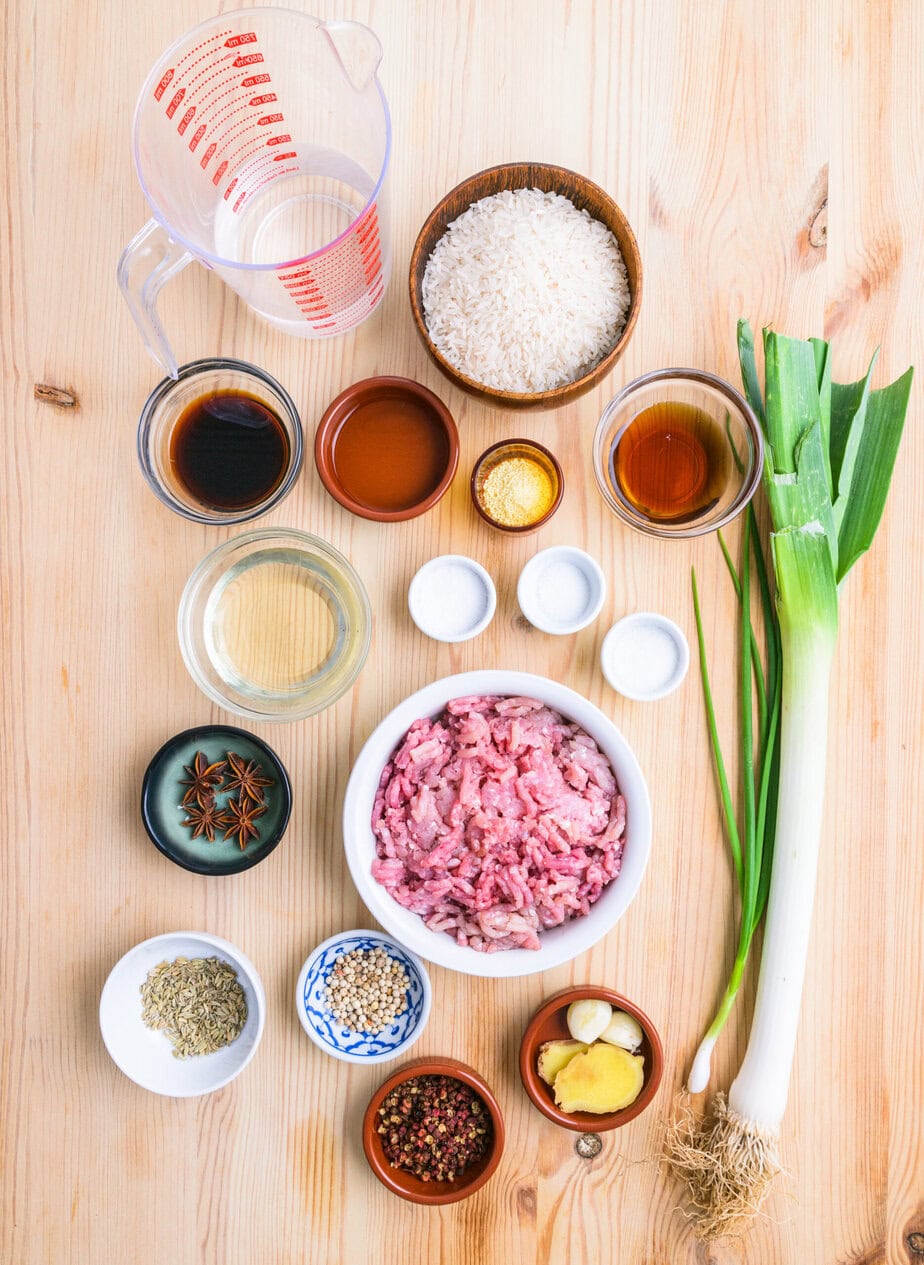
Jasmine rice: the smartest choice for this dish. Its grains are long and fragrant, and they absorb the flavors of the other ingredients beautifully. Texture-wise, it is ideal: soft, just slightly sticky, and perfectly capable of forming the famous crust at the bottom of the pot.
Pork: many cooks use chicken instead, and some versions of Bo Zai Faan even feature fish. For this recipe I will use seasoned ground pork. The meat should be tender and juicy so it can mingle with the other flavors in the dish. Ideally, aim for about 30 percent fat.
Star anise: an aromatic Chinese spice that gives Bou Zai Faan a slight licorice note. It adds a subtle, sweet, aniseed note that beautifully perfumes the oil.
Sichuan pepper: another quintessentially Chinese spice, known for its slightly citrusy note. It is spicy (even numbing!), lending the dish both character and complexity.
MSG: it boosts the umami flavors in the meat marinade. MSG is a flavor enhancer that is used regularly in Asian cooking.
Light soy sauce: whether for seasoning the meat or the sauce, light soy sauce is perfect for balancing the flavors without overloading the dish with salt, especially alongside Shaoxing wine and fish sauce.
Fish sauce: while its taste is salty and fishy, it pairs surprisingly well with Bo Zai Faan, adding essential depth and richness.
Shaoxing wine: while light soy and fish sauce deliver saltiness, Shaoxing wine brings gentle acidity. This rice wine is often used to deglaze or marinate meat and provides that “Chinese cooking” touch we love so much.
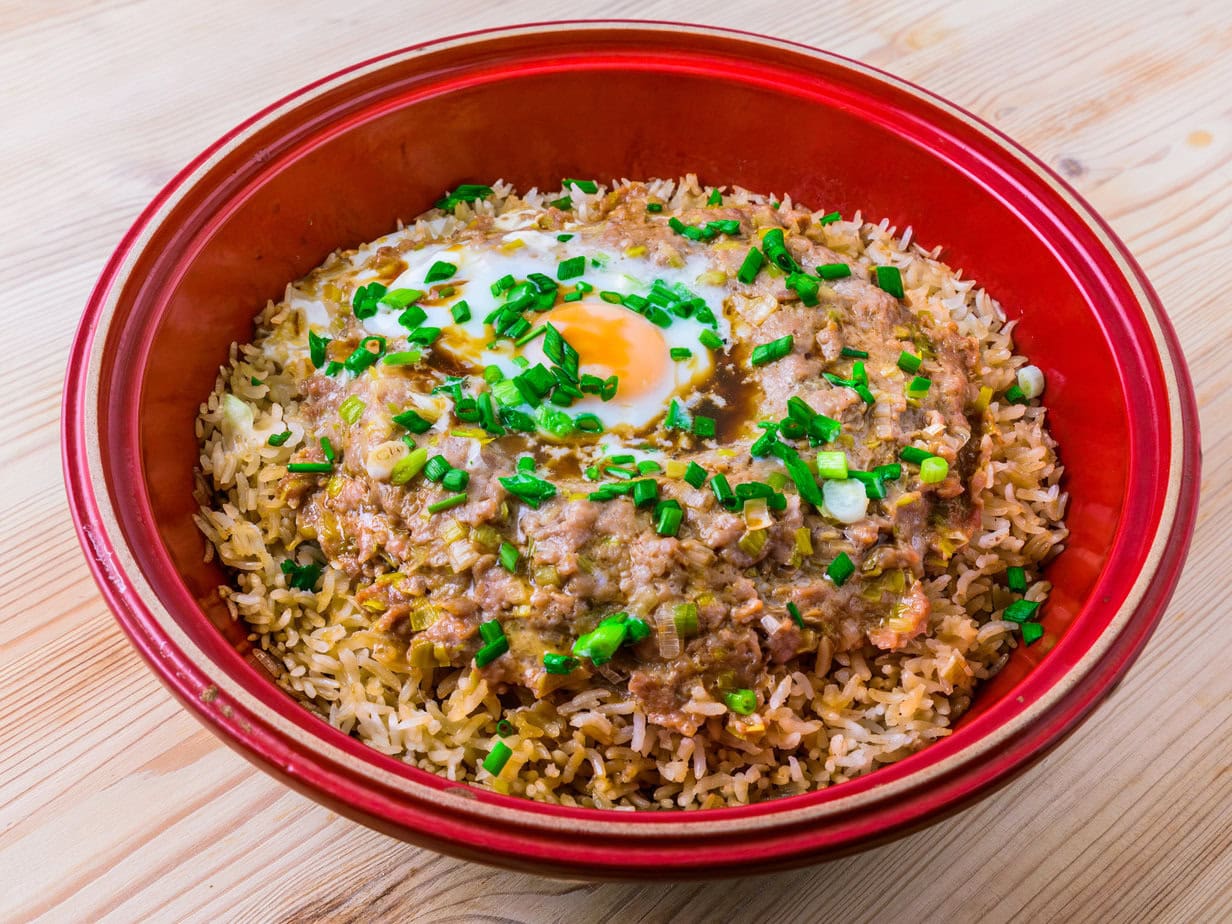
Authentic Bo Zai Fan – Clay-Pot Rice
Ingredients
For the meat
- 300 g ground pork ideally 30% fat
- 1 leek save a few slices for the fragrant oil
For the fragrant oil
- 6 tablespoons peanut oil
- 6 leek slices from the leek you saved
- 4 star anise
- 1 tablespoon fennel seeds
- 1 teaspoon Sichuan peppercorns
- 1 teaspoon white peppercorns
- 2 cloves garlic peeled and gently crushed
For the fragrant water
- 6 tablespoons water just-boiled
- 2 ginger slices
- 1 teaspoon Sichuan peppercorns
Meat seasoning
- 1 teaspoon salt
- 0.5 teaspoon MSG
- 1 teaspoon sugar
- 0.5 teaspoon chicken bouillon powder
- 0.5 tablespoon Shaoxing wine
- 1 tablespoon light soy sauce
For the rice
- 210 g jasmine rice
- 230 g boiling water
- 1 teaspoon vegetable oil
- 1 teaspoon peanut oil or your preferred neutral oil
- 1 egg
- 1 green onion finely chopped
For the seasoned sauce
- 0.5 teaspoon sugar
- A pinch of MSG
- 4 teaspoons light soy sauce
- 2 teaspoons fish sauce
- 1 tablespoon water
Instructions
Fragrant oil
- Warm the peanut oil over low heat.6 tablespoons peanut oil
- Add the leek slices, garlic, and star anise; let them sizzle for about 2 minutes.6 leek slices, 4 star anise, 2 cloves garlic
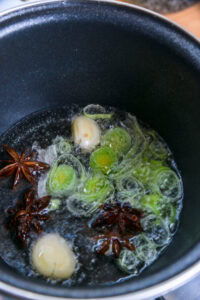
- Stir in the fennel seeds, Sichuan and white peppercorns, and cook for 2 minutes more.1 tablespoon fennel seeds, 1 teaspoon Sichuan peppercorns, 1 teaspoon white peppercorns
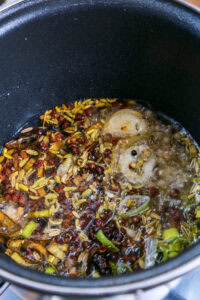
- Remove from the heat and let the spices steep for 10 minutes.
- Strain out the aromatics, then let the oil cool completely.
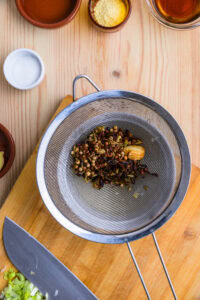
Fragrant water
- Using a mortar or the back of a spoon, bruise the ginger, then add the Sichuan peppercorns.2 ginger slices, 1 teaspoon Sichuan peppercorns
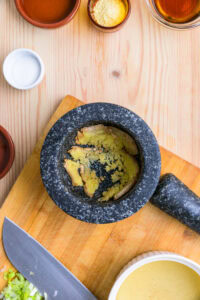
- Pour the just-boiled water over the mixture and steep for at least 10 minutes. Strain and cool completely.6 tablespoons water
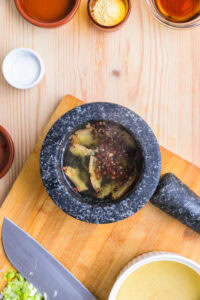
Pork
- Thinly slice the leek.1 leek
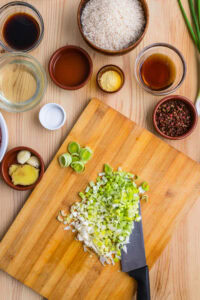
- Place the pork in a large bowl and add all the seasonings.300 g ground pork, 1 teaspoon salt, 0.5 teaspoon MSG, 1 teaspoon sugar, 0.5 teaspoon chicken bouillon powder, 0.5 tablespoon Shaoxing wine, 1 tablespoon light soy sauce
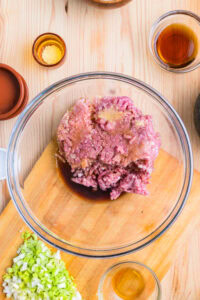
- Stir vigorously in one direction with chopsticks or your hand.
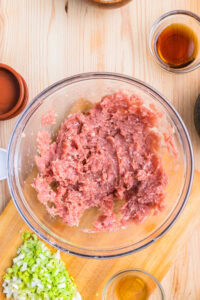
- Drizzle in the fragrant water a tablespoon at a time, mixing until the meat turns tacky and clings to the bowl.
- Don’t rush—mix until everything is well incorporated.
- Add the sliced leek and the cooled fragrant oil; mix until evenly distributed.
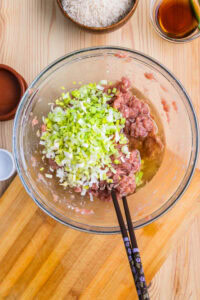
- Cover and refrigerate.
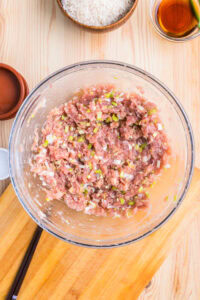
Rice
- Rinse the rice at least three times until the water runs clear, then transfer to a bowl.210 g jasmine rice
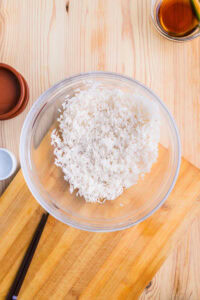
- Bring the measured water to a boil and pour it over the rice.230 g boiling water
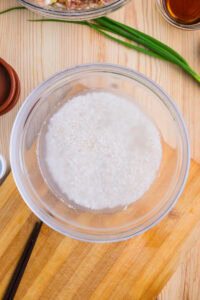
- Cover and soak for 30 minutes.
- Meanwhile, whisk together all the sauce ingredients and set aside.0.5 teaspoon sugar, A pinch of MSG, 4 teaspoons light soy sauce, 2 teaspoons fish sauce, 1 tablespoon water
- After the soak, heat a clay pot (or cast-iron pot with an oven-safe lid) over medium-high heat and coat the bottom with 1 tablespoon peanut oil.1 teaspoon peanut oil
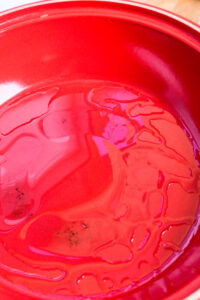
- When the pot is hot, add the rice along with its soaking liquid and level the surface. At this point, preheat the oven to 230 °C / 445 °F.
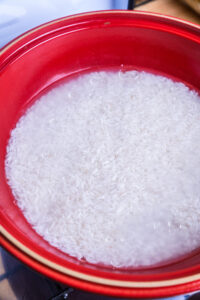
- Cover and cook over medium heat for 8–10 minutes, until vigorous steam escapes.
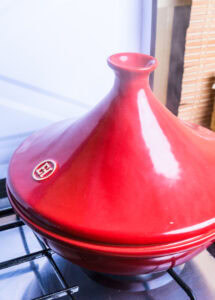
- When the liquid has nearly evaporated, drizzle 1 tablespoon vegetable oil around the inner rim of the pot.1 teaspoon vegetable oil
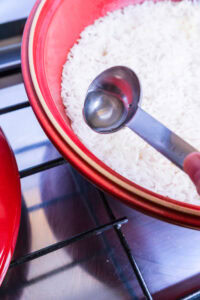
- Cover and cook 1 minute longer.
- Transfer the pot to the preheated oven and bake for 20 minutes.
- Carefully remove the pot, spread the marinated pork over the rice, and leave a well in the centre for the egg.
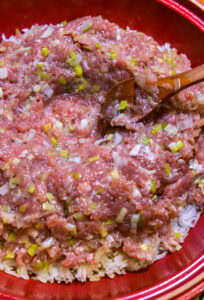
- Return the pot to the oven and cook for another 7 minutes.
- Take the pot out of the oven, pour over the seasoned sauce, and finish on the stovetop over medium-high heat, rotating the pot to evenly brown the base for about 30 seconds.
- Turn off the heat, crack the egg into the centre, cover, and let it sit on the still-hot burner for 5 minutes until just set.1 egg
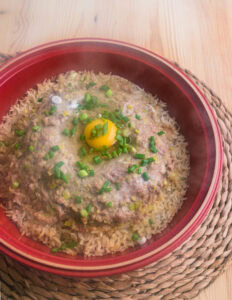
- Sprinkle with green onion and serve right away.1 green onion
